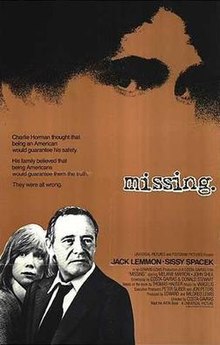Missing (film)
| Missing | |
|---|---|

Theatrical release poster
|
|
| Directed by | Costa-Gavras |
| Produced by | Edward Lewis Mildred Lewis |
| Screenplay by | Costa-Gavras Donald E. Stewart |
| Based on |
Missing by Thomas Hauser |
| Starring | |
| Music by | Vangelis |
| Cinematography | Ricardo Aronovich |
| Edited by | Françoise Bonnot |
|
Production
company |
|
| Distributed by | Universal Pictures |
|
Release date
|
|
|
Running time
|
122 minutes |
| Country | United States |
| Language | English Spanish |
| Budget | $5 million |
| Box office | $14–16 million |
Missing is a 1982 American historical drama film directed by Costa-Gavras and starring Jack Lemmon, Sissy Spacek, Melanie Mayron, John Shea, Janice Rule and Charles Cioffi. It is based on the true story of American journalist Charles Horman, who disappeared in the bloody aftermath of the US-backed Chilean coup of 1973 that deposed the democratically elected socialist President Salvador Allende. The film was jointly awarded the Palme d'Or (with Yol) at the 1982 Cannes Film Festival.
Set largely during the days and weeks following Horman's disappearance, the movie depicts his father and wife searching to determine his fate. The film examines the relationship between Horman's wife Beth (Spacek) and her father-in-law, American businessman Ed Horman (Lemmon).
The film was banned in Chile during Augusto Pinochet's dictatorship, even though neither Chile nor Pinochet are ever mentioned by name (although the Chilean cities of Viña del Mar and Santiago are).
The film opens with Costa-Gavras' statement that the events of the film are true. At first, When Ed arrives in the Latin American country where his son Charles Horman worked, Ed blames his son and his radical political views for his disappearance, but he is later crushed when discovering that the government he reveres so highly has been involved with his son's disappearance and possible death as a collaborator of the dictatorship.
...
Wikipedia
